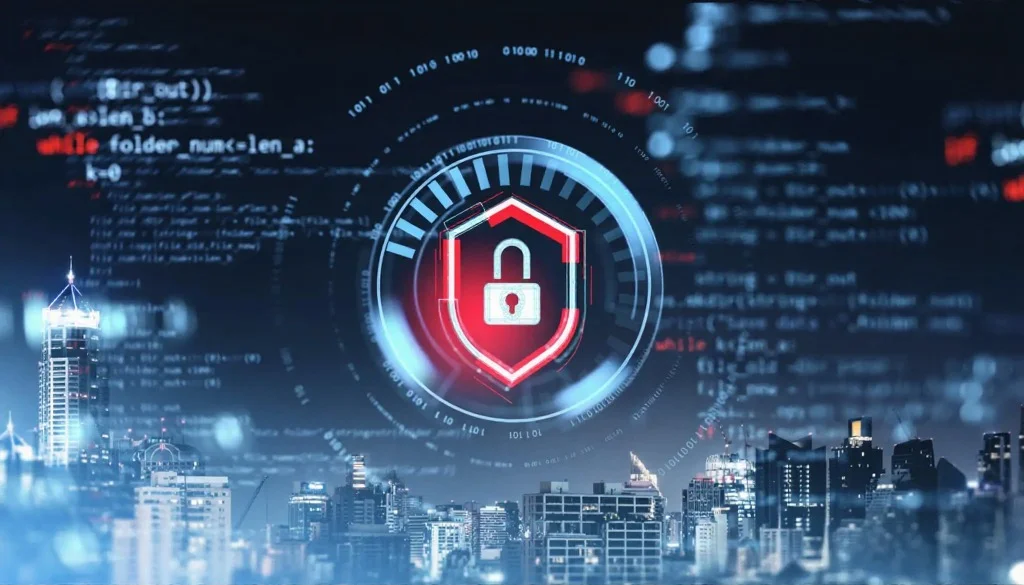Introduction
Today, cybersecurity is crucial. Hackers can’t get into your info or services and steal it. More threats are coming, like viruses and data breaches. Cyberattacks affected both businesses and people and rose by 75% in 2024. This article explains some important questions: How do you begin a job in cybersecurity? How much do they get paid? Do you need to code? We’ll talk about boot camps, licenses, jobs, and how new technology is changing the field.
Cybersecurity Education and Certifications
Education provides access to cybersecurity occupations. Options encompass a wide spectrum of programs, including intensive degrees and brief bootcamps. Each individual acquires the necessary skills to combat cyber threats.
Why Cybersecurity Education Matters
There is a significant demand for cybersecurity positions. By 2033, the U.S. Bureau of Labor Statistics anticipates a 33% increase in the number of security positions. Education teaches risk management, threat detection, and instruments. It equips you with the necessary skills to assume positions such as cybersecurity analyst or engineer. Bootcamps, certifications, and degrees provide you with the necessary skills to combat malware, phishing, and other types of attacks.
Cybersecurity Bootcamp with Job Placement
A cybersecurity academy that includes job placement programs can quickly train beginners. They encompass malware analysis, network security, and incident response. Numerous organizations provide employment guarantees, rendering them an optimal choice for individuals who are transitioning into a new field. The following are the most prominent alternatives:
- Fullstack Academy: This bootcamp is designed to equip pupils with the necessary skills to achieve the CompTIA Security+ certification. It is priced at approximately $15,000. It provides both full-time and part-time options. A tuition refund may be granted to graduates who are unable to secure employment within six months. The curriculum encompasses governance, risk, and compliance (GRC), network security, and threat management.
- Evolve Security: This online bootcamp offers live instruction and hands-on laboratories and has a 93% job placement rate. It is priced at $13,950 and includes a job guarantee. The subjects covered include secure coding, incident response, and threat detection.
- Clarusway: This part-time course is designed to equip students with the necessary skills to pass the CompTIA Security+ exam. It encompasses the fundamentals of information technology, network security, and risk management. Career services assist graduates in locating remote entry-level cybersecurity positions.
- Flatiron School: Available in full-time (15 weeks) or part-time (40 weeks) formats, it costs $9,500. The curriculum includes Python scripting, penetration testing, and cryptography. It boasts a 69% job placement rate.
When choosing a bootcamp, check its reputation, certifications offered, and career support. Alumni reviews and job placement data provide insights. These programs are perfect for those seeking entry-level remote cybersecurity jobs.
Microsoft Cybersecurity Analyst Professional Certificate
The Microsoft Cybersecurity Analyst Professional Certificate is beginner-friendly. Offered on Coursera, it costs $49/month and takes 3–6 months. It teaches:
- The course focuses on protecting against threats through Azure.
- The course utilizes Microsoft Sentinel to handle security operations.
- You can manage identity and access using Azure Active Directory.
You can acquire practical skills through hands-on laboratories. Graduates enjoy a 50% discount on the SC-900 Certification Exam, which is a well-known credential. The program was updated in 2025 and now includes AI skills, such as employing generative AI to find threats. Reviewers have praised the program’s framework and Microsoft tools. It’s perfect for anyone who wants to know, “What does a cybersecurity analyst do?” and for places that use Microsoft products.
Georgia Tech Cybersecurity Masters Program
Advanced students should look at Georgia Tech’s master’s program in cybersecurity. The Online Master of Science in Cybersecurity (OMS Cybersecurity) program costs less than $12,000 and lasts 2–3 years. It takes 32 credit hours, which includes a 5-credit practicum assignment. There are three tracks for students to choose from:
- Information Security: The course of study includes safe software development, network intrusion detection, and forensics.
- Cyber-Physical Systems: This field of study is all about making sure that IoT devices and energy systems stay safe.
- Policy: Looks at laws, privacy, and following the rules.
One of the main classes is Introduction to Information Security (CS 6035). It talks about hazards, cryptography, and keeping networks safe. Specialization courses cover more specific topics, such as how to code securely or how to obey the rules. The practicum uses skills to tackle problems in the real world. To get in, you need to have a bachelor’s degree. It helps to have some experience with technology, but it’s not required. Because of the school’s favorable name, graduates from Georgia Tech are competitive for leadership roles.
Google Cybersecurity Certification: Cost and Value
The Google cybersecurity certification costs $49 a month on Coursera. You can go at your own pace, and it takes 3 to 6 months.
- Finding threats and risks is part of the schoolwork.
- Making sure your code is safe in Python, Linux, and SQL.
- SIEM tools to discover risks.
It helps people get ready for entry-level remote work in cybersecurity. Is the Google cybersecurity certificate worth it? A lot of people say yes because Google is cheap and well-known. Graduates often acquire work as junior analysts. Students who are busy will welcome how flexible the program is.
Choosing Your Path
Boot camps are quick and helpful, so they are perfect for getting in quickly. The Microsoft Cybersecurity Analyst Professional Certificate and the Google Cybersecurity Certificate are both affordable and to the point. The master’s degree in cybersecurity from Georgia Tech is an example of a degree that will help you learn a lot for leadership roles. Take your goals, money, and time into account. Someone who is just starting out could want to earn certificates, whereas someone who has been doing it for a while would want to get a master’s degree.
Cybersecurity Careers and Job Market
Cybersecurity offers rewarding careers. High salaries, remote options, and strong demand make it appealing. Industries like tech, banking, and healthcare need skilled professionals.
Cybersecurity Salaries
Salaries vary by role and experience. Here’s a 2025 breakdown:
|
Role |
Median Salary (2025) |
Key Responsibilities |
|
Cybersecurity Engineer |
$104,283 |
Designs security systems |
|
Cybersecurity Analyst |
$121,500 |
Monitors threats, responds to incidents |
|
Penetration Tester |
$120,000 |
Tests for vulnerabilities |
|
Network Security Engineer |
$97,417 |
Secures network infrastructure |
|
Chief Information Security Officer |
$386,000 |
Oversees security strategy |
Entry-Level Cybersecurity Jobs
There are more and more entry-level cybersecurity jobs that can be done from home. • Cybersecurity Analyst: Watches networks for breaches.
- Junior Penetration Tester: Finds weak spots.
- SOC Technician: Looks after security tools like firewalls
Working from home gives you more freedom. Companies like Google, Microsoft, and banks hire people from all around the world. Getting certifications like CompTIA Security+ makes you more likely to be hired.
Remote work offers flexibility. Companies like Google, Microsoft, and banks hire globally. Certifications like CompTIA Security+ boost employability.
What Does a Cybersecurity Analyst Do?
What is the job of a cybersecurity analyst? Analysts keep systems safe from threats. They: • Watch networks for strange behavior.
• Look into malware or phishing attacks.
• Use Splunk and other SIEM technologies to find threats.
• Make security rules to make sure everyone follows them.
They work with IT teams to protect systems and data, usually with Microsoft Defender or Sentinel.
You can start with certificates from Google or Microsoft. Get experience by working in labs or doing internships. Use LinkedIn or conventions to meet other professionals. Entry is easier with remote jobs. Learn how to find threats, manage risks, and write secure code.
Breaking into Cybersecurity
Beginning with Google or Microsoft certifications is a good idea. Do internships or work in labs to get skills. Meet other workers through conferences or LinkedIn. Remote roles make it easy to get in. Learn how to find threats, handle risks, and write code that is safe.
Cybersecurity Concepts and Terminology
Core ideas are what safety is built on. They teach you about dangers, defenses, and the best ways to handle them.
Is Cybersecurity One Word?
Cybersecurity: Is it a single word? Yes, that’s what NIST and AP Style say. It makes things clearer by combining “cyber” and “security.” In professional situations, using the same language is important.
Does Cybersecurity Require Coding?
Is code needed for cybersecurity? Not all the time. For jobs like penetration testers, who use Python or Bash to automate tasks and look for bugs, being able to code is very important. Analysts may only need to know a small amount of code, like how to write SIEM tools. People who don’t code are responsible for policy or compliance. Learning Python makes you more employable.
What Does CIA Stand for in Cybersecurity?
What does CIA stand for in the world of cybersecurity? We call it the CIA triad:
• Privacy: Keeps information safe from people who shouldn’t have access to it.
• Integrity: Makes sure that info isn’t changed.
• Availability: Makes sure that only authorized people can get into systems.
Security plans, like encryption or backups, are based on the triad.
Building Your Foundation
Learn about things like the CIA triad, how to handle risk, and how to spot threats. Coursera, TryHackMe, and books are all good places to start. To learn how to use tools like Wireshark, do labs. A strong base is important for job success.
Cybersecurity and Emerging Technologies
AI and IoT are two new technologies that are changing the way protection works. They make chances possible, but they also bring about new risks.
How Can Generative AI Be Used in Cybersecurity?
In what ways can creative AI be used to protect computers? Detecting threat trends in Security Operations Centers (SOCs) is one way that generative AI makes security better.
• Automating reaction to incidents with tools that are powered by AI.
• Attack simulations for practice.
• Making SIEMs like Splunk better.
Hackers, on the other hand, use AI to make more complicated malware and phishing emails. Defense teams need to use AI-powered tools to stay ahead.
How Does the Issue of Cybersecurity Relate to the Internet of Things?
What does hacking have to do with the Internet of Things? IoT links things together, like smart thermostats and industrial monitors. Many of these devices don’t have strong protection, so hackers can easily get into them. A breach can put data at risk or mess up systems like power lines.
- Strong authentication
- Regular software updates
- Network separations are some solutions.
- IoT security is critical as connected devices grow.
The Future of Cybersecurity
AI and IoT will lead to new developments in defense. AI makes finding threats better, but it needs to be used in a moral way. IoT calls for better device security. Professionals need to learn how to use new tools and keep up with new threats. It’s important to keep learning.
Conclusion
Security is an area that’s doing very well. For example, a cybersecurity program that helps you find a job, the Microsoft Cybersecurity Analyst Professional Certificate, or a cybersecurity master’s degree from Georgia Tech can help you get ready for success. There are high salaries for these jobs. For example, the starting pay for someone new to cybersecurity is $70,000. Ideas like the CIA triad are very important. The future is shaped by trends like IoT and creative AI. Begin your journey to keep our online world safe.



